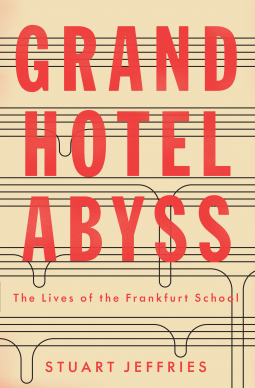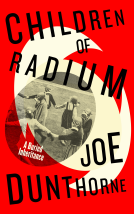
Grand Hotel Abyss
The Lives of the Frankfurt School
by Stuart Jeffries
This title was previously available on NetGalley and is now archived.
Buy on Amazon
Buy on BN.com
Buy on Bookshop.org
*This page contains affiliate links, so we may earn a small commission when you make a purchase through links on our site at no additional cost to you.
Send NetGalley books directly to your Kindle or Kindle app
1
To read on a Kindle or Kindle app, please add kindle@netgalley.com as an approved email address to receive files in your Amazon account. Click here for step-by-step instructions.
2
Also find your Kindle email address within your Amazon account, and enter it here.
Pub Date Sep 20 2016 | Archive Date Sep 20 2016
Verso Books (US) | Verso
Description
“Marvelously entertaining, exciting and informative.” —Guardian
“An engaging and accessible history.” —New York Review of Books
This group biography is “an exhilarating page-turner” and “outstanding critical introduction” to the work and legacy of the Frankfurt School, and the great 20th-century thinkers who created it (Washington Post).
In 1923, a group of young radical German thinkers and intellectuals came together to at Victoria Alle 7, Frankfurt, determined to explain the workings of the modern world. Among the most prominent members of what became the Frankfurt School were the philosophers Walter Benjamin, Theodor Adorno, Max Horkheimer, and Herbert Marcuse. Not only would they change the way we think, but also the subjects we deem worthy of intellectual investigation. Their lives, like their ideas, profoundly, sometimes tragically, reflected and shaped the shattering events of the twentieth century.
Grand Hotel Abyss combines biography, philosophy, and storytelling to reveal how the Frankfurt thinkers gathered in hopes of understanding the politics of culture during the rise of fascism. Some of them, forced to escape the horrors of Nazi Germany, later found exile in the United States. Benjamin, with his last great work—the incomplete Arcades Project—in his suitcase, was arrested in Spain and committed suicide when threatened with deportation to Nazi-occupied France. On the other side of the Atlantic, Adorno failed in his bid to become a Hollywood screenwriter, denounced jazz, and even met Charlie Chaplin in Malibu.
After the war, there was a resurgence of interest in the School. From the relative comfort of sun-drenched California, Herbert Marcuse wrote the classic One Dimensional Man, which influenced the 1960s counterculture and thinkers such as Angela Davis; while in a tragic coda, Adorno died from a heart attack following confrontations with student radicals in Berlin.
By taking popular culture seriously as an object of study—whether it was film, music, ideas, or consumerism—the Frankfurt School elaborated upon the nature and crisis of our mass-produced, mechanized society. Grand Hotel Abyss shows how much these ideas still tell us about our age of social media and runaway consumption.
“An engaging and accessible history.” —New York Review of Books
This group biography is “an exhilarating page-turner” and “outstanding critical introduction” to the work and legacy of the Frankfurt School, and the great 20th-century thinkers who created it (Washington Post).
In 1923, a group of young radical German thinkers and intellectuals came together to at Victoria Alle 7, Frankfurt, determined to explain the workings of the modern world. Among the most prominent members of what became the Frankfurt School were the philosophers Walter Benjamin, Theodor Adorno, Max Horkheimer, and Herbert Marcuse. Not only would they change the way we think, but also the subjects we deem worthy of intellectual investigation. Their lives, like their ideas, profoundly, sometimes tragically, reflected and shaped the shattering events of the twentieth century.
Grand Hotel Abyss combines biography, philosophy, and storytelling to reveal how the Frankfurt thinkers gathered in hopes of understanding the politics of culture during the rise of fascism. Some of them, forced to escape the horrors of Nazi Germany, later found exile in the United States. Benjamin, with his last great work—the incomplete Arcades Project—in his suitcase, was arrested in Spain and committed suicide when threatened with deportation to Nazi-occupied France. On the other side of the Atlantic, Adorno failed in his bid to become a Hollywood screenwriter, denounced jazz, and even met Charlie Chaplin in Malibu.
After the war, there was a resurgence of interest in the School. From the relative comfort of sun-drenched California, Herbert Marcuse wrote the classic One Dimensional Man, which influenced the 1960s counterculture and thinkers such as Angela Davis; while in a tragic coda, Adorno died from a heart attack following confrontations with student radicals in Berlin.
By taking popular culture seriously as an object of study—whether it was film, music, ideas, or consumerism—the Frankfurt School elaborated upon the nature and crisis of our mass-produced, mechanized society. Grand Hotel Abyss shows how much these ideas still tell us about our age of social media and runaway consumption.
Advance Praise
“Stuart Jeffries has produced a compelling and politically pressing group portrait of the philosophers associated with the Frankfurt School. Their thinking has never seemed less forbidding and more inspiring.”
—Matthew Beaumont, author of Nightwalking
“Throughout the book, Jeffries demonstrates that he is comfortable and conversant with the often thorny philosophical ideas of his subjects. A rich, intellectually meaty history.”
—Kirkus
—Matthew Beaumont, author of Nightwalking
“Throughout the book, Jeffries demonstrates that he is comfortable and conversant with the often thorny philosophical ideas of his subjects. A rich, intellectually meaty history.”
—Kirkus
Available Editions
| EDITION | Other Format |
| ISBN | 9781784785680 |
| PRICE | $26.95 (USD) |

















